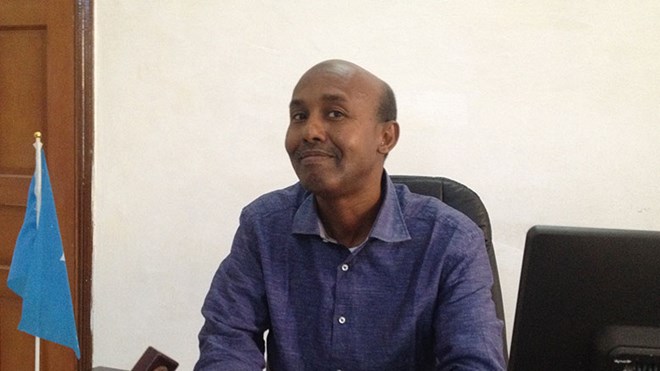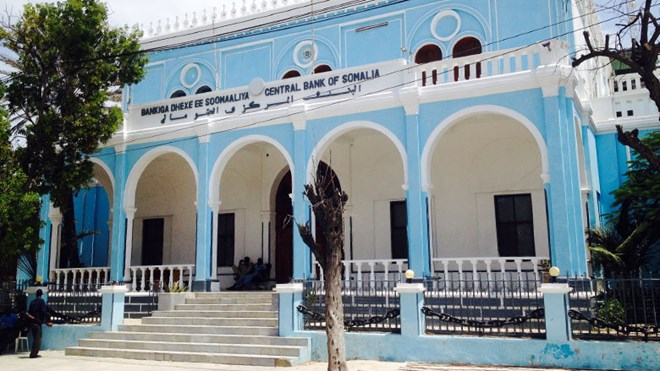
Thursday March 2, 2017

The Somali Core Economic Institutions and Opportunities Program (SCORE) is the first in a series of projects to develop legal, regulatory and policy framework for key Somali financial institutions. The objectives are to improve the enabling environment for private and financial sector development, and catalyze private investment and job creation across Somalia. Phase I of the project focuses on strengthening the central bank, investment climate and port sector, as well as direct and indirect support to small-medium enterprises (SMEs).
Abdishakur Mohamud is the focal point for the project at the Central Bank of Somalia (CBS).
World Bank: How would you describe the SCORE project to someone who isn’t well aware of the financial sector?
Abdishakur Mohamud: The project basically helps the major financial institutions, such as the Central Bank and the Ministry of Commerce and Industry, in setting a good standard on how business should be done in Somalia.
More specifically, the project provides robust financial standards and a guideline on how the relationship between the government and private sector can best benefit both parties and the consumer. It also sets high standards on financial supervision and oversight to encourage transparent governance in financial institutions. That way, the government, private sector and the consumer can safely use their financial resources to benefit one another.
The institutions that are benefiting from SCORE also includes the State Bank of Puntland, Central Bank of Somaliland, and ports in Mogadishu and Bosaso.
Can you give an example?
AM: For example, if a financial institution operates in Mogadishu, how can we as a country make sure that they provide services in a safe and responsible way including paying their fair share of taxes to the government? And how can the government make Somalia is as business friendly as possible, for both existing businesses and interested investors?
One way this project is doing both these things is introducing standardized business licensing and regulatory framework for financial services. A few years ago, your financial institution licenses were dependent on who you knew. At the Central Bank, standards for financial institution licenses are being strengthened in order to enhance integrity and safety of the financial system as a whole. At the Ministry of Commerce and Industry registration standards for businesses are being harmonized and digitalized, it’ll be super quick to obtain registration, ease to search for businesses which operate here, and their shareholders and directors as well as sectors they contribute to in the Somali economy.
And how does the project benefit the Somali general public?
AM: This is the important part – although the project supports Public and Private sector harmony, one of the absolute most crucial beneficiaries are everyday Somalis. Like I said before, the project aims to set a strong standard on how business should done in Somalia, and that includes how the consumer is protected. By building a transparent financial sector, households and business people can realize their ambitions to innovate and generate greater returns from their investments.
As I said before, setting a good standard will enable business people to innovate, existing firms to expand their operations, and ultimately increase production and employment opportunities.
Let me give you an example. If a commercial bank goes bankrupt in Mogadishu or elsewhere in Somalia, how would someone with money in that bank be assured that they wouldn’t lose it? It’s a very simple but important question the SCORE project addresses. By setting prudential standards of how business is done in Somalia, the general public will have more confidence in the public and private sector. Perhaps they’ll be more attracted to opening a business, which will generate more revenue in Somalia and so on.
And it’s important to note that this is welcomed by both sectors. If a private investor wants to work in Somalia, how can that person know which rules he or she needs to comply with? And what rules can that person refer to, if they don’t exist? It’s all about making Somalia a business friendly nation!
WB: What else does the SCORE project do?
AM: We have a few other components to the project that all tie to the overall objective. We’re benefiting from the mobile money boom in Somalia, which was led by the private sector. We aim to pay civil servants salaries to teachers, healthcare workers and the military. We’re also looking at collecting taxes through this system. That way, the transactions will be done with very low risk and more transparent way.
The SCORE project is also spearheading a market survey of demand and supply of financial services in Somalia. Somalia is in desperate need of reliable data, and the market survey will determine basic market data that’s important for any type of economic regulation.
It’s important to view this all as a working process. SCORE doesn’t question the way the private sector has been operating in Somalia without a government. Instead, it recognizes its resilience and supports other citizens in reaching the same heights as those companies.

Central Bank of Somalia building
How did you get involved in working with the Central Bank?
I attended the Somalia Institute of Development Administration and Management (SIDAM) in Mogadishu in the 80’s, where I earned my business degree. I then earned my MBA in Canada.
After 20 years in Canada, I joined the newly resurrected Central Bank of Somalia as Chief Advisor to the Governor. I was fortunate enough to work as a consultant for the Central Bank, and as I had the technical knowledge and experience with the financial institutions, I was picked as the focal point for this project to liaise the CBS, beneficiary institutions, private sectors and other stakeholders.
What advice would you give young Somali people interested in finance?
Technology is the future! Salaries through mobile pay, cheaper business licensing and digitalized consumer protection all point to a country which is going digital. It makes things cheaper, easier and much more transparent. I’d tell young people to look for ways to innovate the Somali economy.